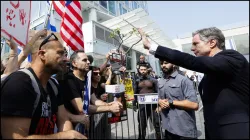Hamas unwilling to settle for temporary ceasefire in Gaza, wants permanent end to war: Sources
A deal proposed by Egypt suggested the release of 33 hostages in exchange for 600 Palestinian prisoners and a pause in fighting. However, Israel has pledged to attack the Rafah city "with or without" a deal, further raising global alarm.

Cairo: Amid negotiations in Cairo for a ceasefire in the ongoing Israel-Hamas war in the Gaza Strip, it has come to light that the Palestinian militant group has expressed concern over the temporary ceasefire and has informed mediators that it wants a permanent conclusion to the conflict, according to sources. This underscores the vast differences between Israel and Hamas as international pressure rises on both sides for a ceasefire.
According to Egyptian sources, Hamas informed that they want a total end to the war and rehabilitation of Palestinians who are displaced from north Gaza to the southern Gaza region after the war broke out. Sources in Israeli Prime Minister Benjamin Netanyahu's office told news agency IANS that they have received information that Hamas is not willing towards a temporary ceasefire.
According to Israel's Defense Ministry sources, Hamas will have to provide a response to the mediators on Thursday, on its position regarding the hostages. Netanyahu has told US Secretary of State Antony Blinken that Israel will attack Rafah city, where over a million people are sheltering, "with or without" a ceasefire deal and they have already deployed a military unit in the region.
An "extraordinarily generous" ceasefire deal
This came after Hamas was considering a new framework proposed by Egypt, described by Blinken as "extraordinarily generous", that has called for it to release as many as 33 hostages abducted from Israel on October 7 last year in exchange for a pause in prolonged hostilities. The proposal, which Israel helped craft but did not fully agree to, comes at a time of rising international alarm over a possible Israeli invasion in the city of Rafah in Gaza.
The latest proposal by Egypt is laid into two phases - the first of which calls for the release of 20 to 33 hostages to be released over several weeks in exchange for the pause and the release of 600 Palestinian prisoners. The second phase entails what sources describe as the "restoration of sustainable calm", during which the remaining hostages, captive Israeli soldiers and the bodies of hostages will be exchanged for more Palestinian prisoners.
This is possibly a step towards ending the devastating war, where more than 34,000 Palestinians have been killed and most of the territory has been flattened, after months of deadlock. However, a failure to agree would deepen Israeli presence in Gaza. "In this moment the only thing standing between the people of Gaza and a ceasefire is Hamas. They (Hamas) have to decide and they have to decide quickly. I’m hopeful that they will make the right decision," Blinken told World Economic Forum (WEF) President Børge Brende in the Saudi capital Riyadh.
What does Hamas want?
Hamas has maintained that a permanent ceasefire and full Israeli withdrawal are prerequisites for any agreement. Conversely, Israel has affirmed its commitment to continue its operation in Gaza until Hamas is eradicated. However, Israel has recently agreed to Hamas's demand for unrestricted movement of Palestinians to northern Gaza, a concession pivotal in advancing negotiations.
A senior official from key intermediary Qatar, meanwhile, urged Israel and Hamas to show “more commitment and more seriousness" in negotiations. Qatar, which hosts Hamas' headquarters in Doha, was instrumental along with the US and Egypt in helping negotiate a brief halt to the fighting in November that led to the release of dozens of hostages. But in a sign of frustration, Qatar this month said that it was reassessing its role.
In a meeting with Netanyahu on Wednesday, Blinken said he has still not seen a plan for Israel's planned offensive on the southern Gaza city of Rafah that would protect civilians, repeating that Washington could not support such an assault. "There are other ways and in our judgment better ways, of dealing with the ... ongoing challenge of Hamas that does not require a major military operation in Rafah," he said, adding that it was the subject of ongoing talks with Israeli officials.
(with inputs from agencies)
ALSO READ | India at UN reaffirms support to two-state solution for Palestine, urges resumption of peace talks